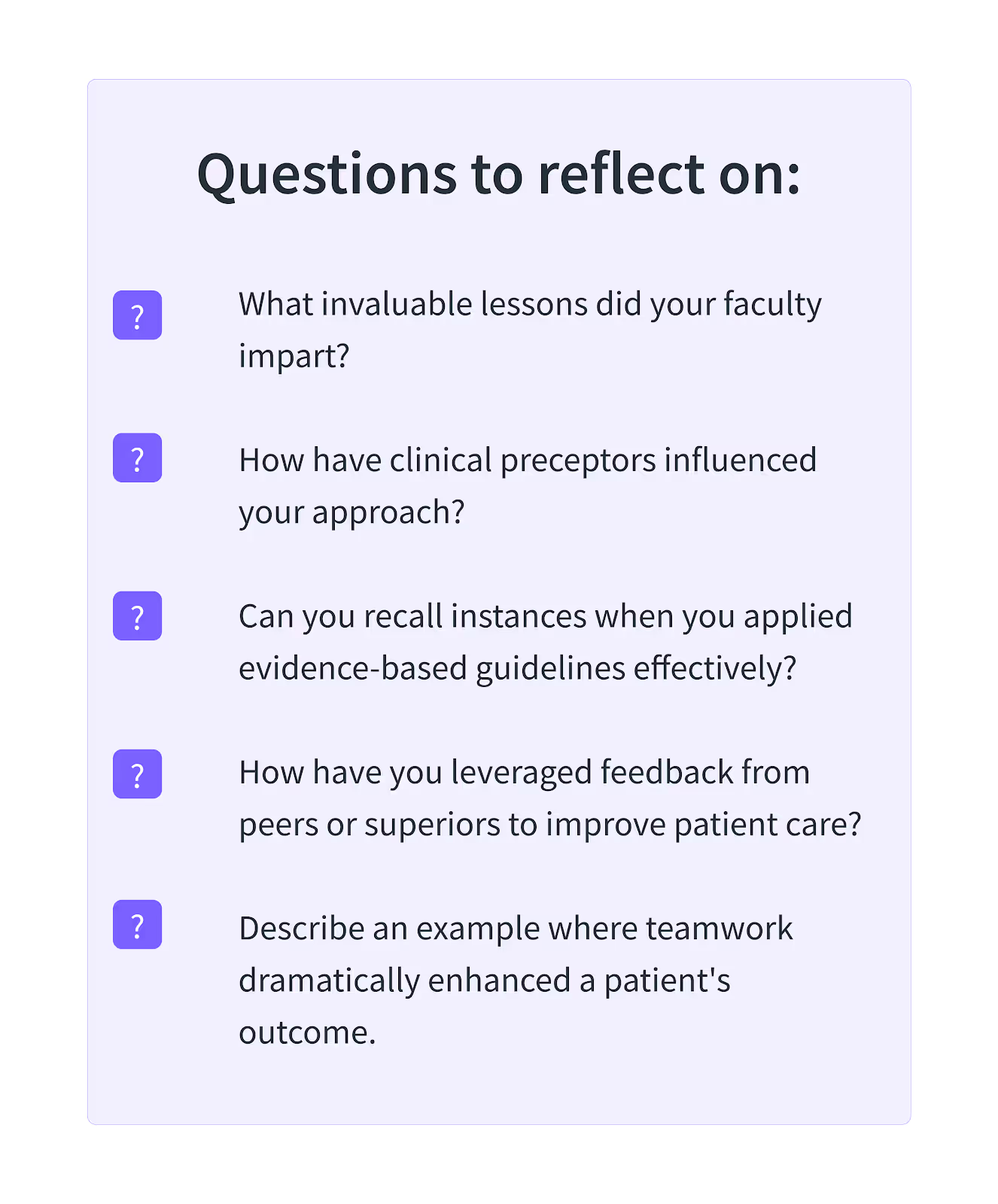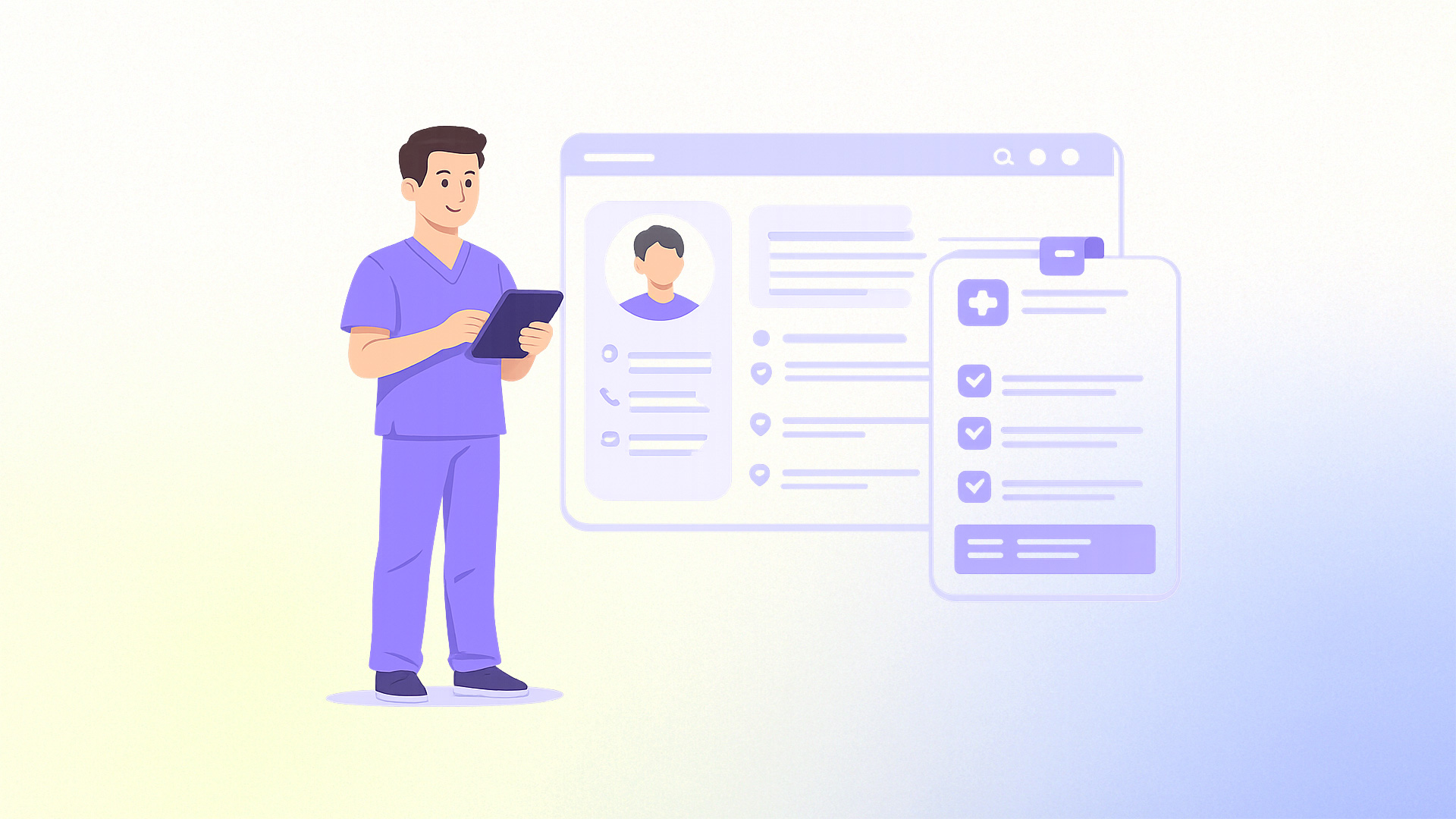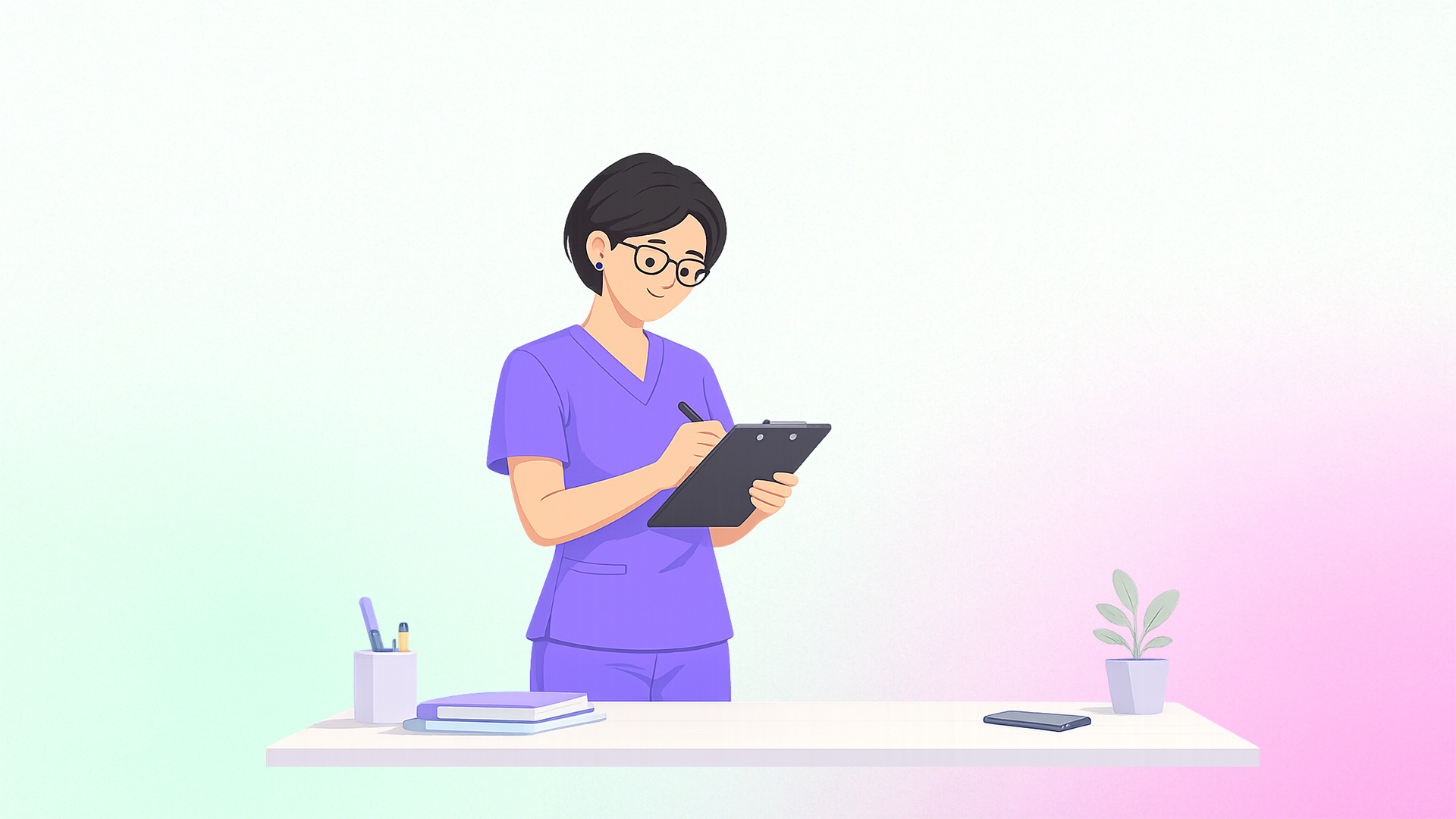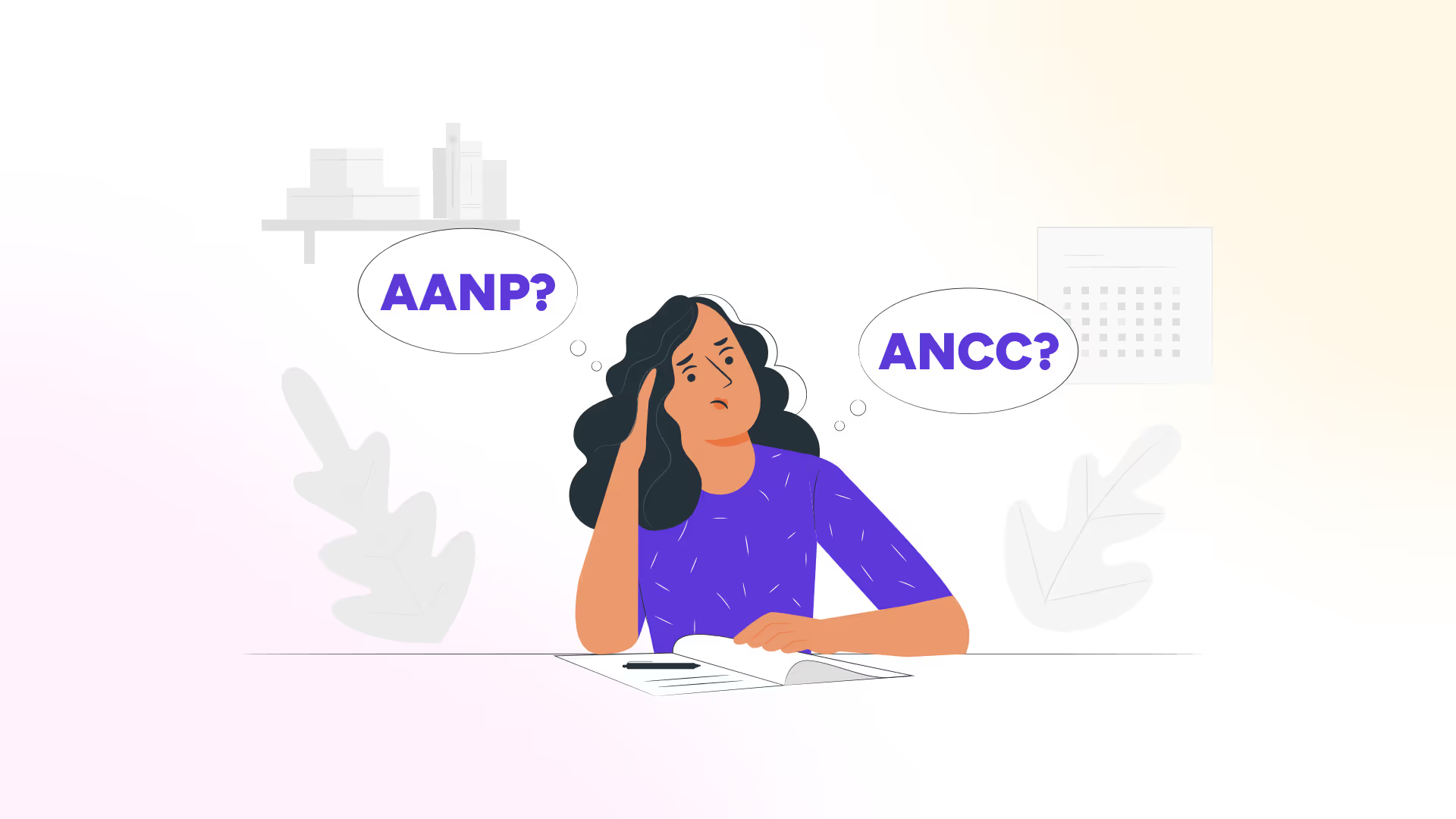TL;DR: Nurse Practitioner Job Interview Questions — 11 Essential Preparation Tips
- Reflect on your NP journey — Highlight clinical experience, communication skills, and what makes you a strong candidate for the nurse practitioner role.
- Tailor your prep — Align your resume and responses with the job description, mission statement, and values of your potential employer.
- Practice common NP interview questions — Use the STAR method for behavioral questions on patient care, conflict resolution, and ethical dilemmas.
- Research compensation — Know salary benchmarks and total compensation, but save negotiations for later unless prompted by the hiring manager.
- Follow up and stay curious — Send a thank-you email, ask informed questions, and show commitment to lifelong learning and personalized care.
Job interviews for nurse practitioners (NPs) are a significant milestone in your professional journey, especially if you're stepping into the nurse practitioner role as a new graduate.
They mark the culmination of years of dedicated academic and clinical training and set the stage for your future career. Whether you're transitioning from a registered nurse position in healthcare or entering the field fresh from your studies, the interview process is your opportunity to showcase your clinical expertise, passion, and readiness for the challenges ahead.
In today's dynamic healthcare environment, the expectations for nurse practitioners are continually evolving. With advancements in medical technology, changing patient demographics, and an increased focus on interdisciplinary collaboration with healthcare professionals, NPs must be more prepared than ever to meet these demands. Your nurse practitioner interview is not just a test of your medical knowledge but also an assessment of how well you can adapt to and thrive in this ever-changing landscape while delivering exceptional patient care.
This comprehensive guide will delve into the intricacies of the nurse practitioner interview process, providing you with a roadmap to success. By coupling your foundational knowledge with updated interview preparation techniques, you can set yourself up for success in this crucial phase of your career journey. Whether you're looking for your dream job or aiming to advance your career, these strategies will help you navigate common NP interview questions with confidence.
Ready to put your interview skills to work? Once you've mastered these preparation techniques, it's time to find nurse practitioner positions that match your expertise. Discover exciting NP job opportunities and connect with healthcare teams looking for dedicated professionals like you.
Interview Questions for Nurse Practitioners: Tips for a Successful NP Job Interview
1. Acknowledge Your Worth as a Nurse Practitioner
Recognizing the Value of Your Experience
As an NP candidate, it’s essential to understand and acknowledge the value of your experiences, both academic and clinical. The journey to becoming an NP is rigorous, encompassing years of intense study, hands-on clinical training, and the successful completion of certification exams. Each of these experiences has contributed to your professional development, shaping you into a capable and competent healthcare provider.
These experiences are integral to your overall nursing career, providing a solid foundation for professional growth and job hunting.
During your interview, it’s important to draw upon these experiences confidently. For example, reflect on the moments when you successfully applied evidence-based guidelines to diagnose and treat patients. These instances not only demonstrate your clinical skills but also highlight your ability to translate theoretical knowledge into practical, patient-centered care.
Moreover, remember that your experiences extend beyond the clinical setting. Think about the challenges you faced during your studies, such as balancing academic demands with clinical rotations or managing complex patient cases under supervision. These experiences have likely strengthened your problem-solving abilities, resilience, and capacity to work under pressure—all qualities that are highly valued in an NP.
Questions to Reflect On
Before stepping into the interview room, take some time to reflect on your journey. Consider the following questions:
- What were the most challenging aspects of your NP training, and how did you overcome them?
- Can you recall a specific patient case that had a significant impact on your professional growth?
- How have your academic and clinical experiences prepared you for the role of an NP in today’s healthcare environment?
Other NP interview questions include:

Reflecting on these questions, along with common NP interview questions, can help you prepare thoroughly and boost your confidence. By pondering these questions, you’ll be better prepared to discuss your experiences in a way that resonates with interviewers and underscores your qualifications for the position.
2. Chronicle Your Journey Clearly
Crafting a Compelling Resume
Your resume is more than just a list of qualifications and experiences; it’s a narrative that tells the story of your professional journey. For Nurse Practitioners, this story should convey your passion for healthcare, your commitment to high quality patient care, and your readiness to take on the responsibilities of the NP role.
When crafting your resume, focus on clarity, relevance, and impact. Tailor your resume to the specific demands of the position you’re applying for. Highlight your clinical experiences, particularly those that align with the job description. For example, if you’re applying for a position in a family practice, emphasize your experience in primary care settings, including any rotations or internships where you managed chronic conditions, performed health assessments, or provided patient education.
In addition to your clinical experiences, include any relevant academic achievements, certifications, and professional affiliations. If you’ve published research, presented at conferences, or participated in quality improvement projects, be sure to include these as well. These accomplishments demonstrate your dedication to continuous learning and your contribution to the advancement of the nursing profession.
Fundamental Components of Your Resume
When structuring your resume, ensure it includes the following key components:
- Contact Information: Include your name, address, phone number, and email address. Make sure your email address is professional.
- Objective Statement: A brief statement outlining your career goals and what you hope to achieve in the NP role. Tailor this statement to the specific position you’re applying for.
- Licensure and Certifications: Clearly list your current NP licensure, any state-specific licenses, and relevant certifications (e.g., ACLS, PALS, FNP-BC, or AGACNP-BC).
- Education: Detail your educational background, including your NP program, undergraduate degree, and any relevant continuing education.
- Clinical Experience: Provide a detailed account of your clinical rotations, internships, and any work experience related to the NP role. Highlight specific skills and competencies you gained in each setting.
- Professional Experience: Include any relevant work experience outside of your clinical rotations, such as RN roles, volunteer work, or leadership positions in student organizations.
- Skills: List specific skills relevant to the NP role, such as diagnostic procedures, electronic health record (EHR) proficiency, patient education, and team collaboration.
- Professional Affiliations: Mention any memberships in professional organizations like the American Association of Nurse Practitioners (AANP) or state-specific NP associations. Being part of a network of healthcare professionals is crucial for staying updated and connected in the field.
- References: Consider including a section for references or indicating that they are available upon request.
By organizing your resume thoughtfully and ensuring it aligns with the job you’re applying for, you’ll make a compelling case for your candidacy.
3. Prepare, Practice, Present
The Importance of Practice
Interview preparation is crucial for success in securing your nurse practitioner position. It involves more than just reviewing potential nurse practitioner interview questions; it's about understanding the interview's flow, practicing your responses, and preparing to present yourself as the best candidate for the job. Practice is essential for becoming a skilled nurse practitioner, as it helps you refine your communication skills and effectively demonstrate your clinical expertise to potential employers.
Start by researching the healthcare facility where you're interviewing. Understand its mission statement, values, patient population, and the specific nurse practitioner role within the organization. This knowledge will allow you to tailor your responses to align with the facility's culture and expectations, showing how you can contribute to their healthcare team and improve patient outcomes.
Next, anticipate the common NP interview questions you might be asked and prepare your answers. Typical nurse practitioner interview questions include:
- Why did you choose to become a Nurse Practitioner?
- How do you handle challenging patient cases or when a patient refuses treatment?
- Can you describe a time when you worked as part of an interdisciplinary healthcare team?
- How do you stay current with evidence-based guidelines and developments in the medical field?
- Describe your approach to patient education and ensuring patient safety
- How would you handle a stressful situation in an emergency department setting?
When answering these behavioral questions, use the STAR method (Situation, Task, Action, Result) to structure your responses. This approach helps you provide clear, concise, and impactful answers that highlight your problem-solving skills, critical thinking, and clinical expertise while demonstrating your ability to work closely with other healthcare professionals.
Practice Questions and Mock Interviews for Nurse Practitioner Interview Questions
Practice answering these practitioner interview questions out loud, either on your own or with someone. Consider conducting mock interviews to simulate the actual interview environment. This practice can help you refine your responses, manage your nerves, and improve your confidence. It is also crucial to practice nurse practitioner interview questions to understand what hiring managers are looking for and to be well-prepared for specific areas such as primary care, acute care, emergency department, and specialized NP interview scenarios.
Focus on demonstrating your technical skills, medical knowledge, and ability to provide personalized care while maintaining a holistic approach to patient treatment. Practice discussing how you coordinate care with nursing staff, handle ethical dilemmas, and make informed decisions based on evidence-based guidelines.
In addition to preparing your answers, think about the questions you want to ask the interviewers. Remember, a nurse practitioner interview is a two-way street. Asking thoughtful questions shows your genuine interest in the role and your desire to ensure it's the right fit for your career goals. Some questions you might consider include:
- What are the primary responsibilities of the NP in this role?
- How does the organization support continuing education and professional development for nurse practitioners?
- Can you describe the team dynamics and how NPs collaborate with other healthcare providers?
- What are the key challenges facing this facility, and how can an NP contribute to addressing them?
- How does the organization ensure patient safety and quality patient care?
As you develop confidence in your interview preparation, ensure you're targeting the right opportunities that match your clinical experience and career aspirations. Explore current nurse practitioner job at NPHire to find roles where your newly honed interview skills and clinical expertise can make the greatest impact on patient care.
By preparing and practicing thoroughly, you'll be well-equipped to present yourself as a confident, knowledgeable, and capable candidate ready to excel in any nurse practitioner role, whether in primary care, acute care, or specialized healthcare settings.
4. Speak the Language of the Facility
Aligning with Organizational Culture and Expectations
Every healthcare facility is unique, and your ability to reflect its specific values during the nurse practitioner job interview can set you apart from other candidates. This goes beyond reviewing the job description—this is about showing that you belong there. Before stepping into the interview, research the organization’s mission statement, services, patient population, and how they define high quality patient care. This kind of interview preparation shows initiative and professionalism.
Many nurse practitioners overlook the importance of speaking the same “language” as their potential employer. During the interview process, reflect the organization’s values in your responses. For instance, if the clinic is rooted in community-based primary care, emphasize your experience working with underserved populations and your passion for patient education. If they focus on holistic approaches, discuss how your treatment plans consider the patient’s family, lifestyle, and mental well-being—not just their lab tests.
Matching their tone doesn’t mean being inauthentic. It means showing that your own nursing career and philosophy are in sync with their mission. This also helps when answering behavioral interview questions. For example, if asked how you delegate tasks or collaborate with other healthcare professionals, refer to actual clinical scenarios that mirror their work environment.
Use familiar keywords they’ve used in their job posting. If the facility frequently mentions things like “open communication,” “team-based care,” or “broad range of services,” find opportunities to naturally weave these into your interview answers. Employers want to know you’re not just a skilled nurse practitioner, but one who thrives in theirsetting.
Questions to Ask Yourself Before the Interview:
- How does this facility define exceptional patient care?
- What words or phrases appear repeatedly in their job postings or website?
- Can I provide specific examples from my experience that align with their priorities?
By demonstrating that you’ve done your homework and understand the work environment, you’ll establish early on that you’re the right candidate—not just clinically, but culturally.
5. First Impressions Matter

The Power of Professional Appearance
First impressions are crucial, and your appearance plays a significant role in shaping how you’re perceived during an interview. The way you present yourself reflects your professionalism, attention to detail, and respect for the interview process.
When choosing your interview outfit, opt for attire that is professional, polished, and appropriate for the healthcare setting. Business attire is typically the norm for NP interviews. For women, a tailored suit or a conservative dress with a blazer is a good choice. For men, a suit and tie or a dress shirt with a blazer and slacks is recommended. Being prepared for different healthcare settings, such as the fast-paced emergency department, underscores your adaptability and readiness for various professional environments.
In addition to your clothing, pay attention to other aspects of your appearance, such as grooming, accessories, and footwear. Ensure that your outfit is clean, pressed, and well-fitted. Avoid overly flashy jewelry or accessories, and opt for a clean, natural look in terms of makeup and hairstyle.
Remember that comfort is also important. Choose an outfit that allows you to move comfortably and confidently. If you’re uncomfortable in your clothing, it may affect your performance during the interview.
Planning Ahead
To avoid any last-minute stress, plan your outfit well in advance of the interview. Try on your chosen attire a few days before to ensure it fits well and doesn't require any adjustments. Lay out your outfit the night before the interview to avoid any morning rush.
In addition to your clothing, consider the practical aspects of the interview day. Plan your route to the interview location, accounting for potential traffic or delays. Arrive early to give yourself time to compose yourself and review any last-minute notes.
By paying attention to these details, you'll be able to present yourself confidently and make a strong first impression on your interviewers.
6. Be Ready to Talk Through a Clinical Scenario
Showcasing Critical Thinking and Clinical Decision-Making
During your nurse practitioner interview, you’ll likely be asked to walk through a clinical case. This is one of the most important types of nurse practitioner interview questions because it shows how you think. Employers want to see your critical thinking skills in action—how you synthesize patient symptoms, interpret lab tests, weigh treatment options, and provide exceptional patient care. These are some of the most common NP interview questions, especially for roles in urgent care, emergency department, or primary care settings.
For instance, the interviewer might ask:
"A 45-year-old patient comes in with a sore throat, fatigue, and a fever. How would you approach this case?"
Here, they’re assessing how you determine whether the cause is viral or bacterial infections, what diagnostics or lab tests you’d order, and when you’d decide to prescribe antibiotics. They’re also watching for how you communicate with the patient and how you remain calm while managing clinical uncertainty—especially important in a stressful situation.
Use a structured approach to answer: History, Physical Exam, Differential Diagnosis, Diagnostics, Treatment Plan, and Follow Up. Reference how you’d use electronic health records or electronic medical records to support your workflow, and highlight how you’d communicate results and educate the patient and their family.
Extra tip: Don’t just talk about the medicine. Show how you work closely with other healthcare professionals—like RNs, physicians, and care coordinators—to ensure a safe and thorough approach. Include examples that demonstrate how you’ve used effective communication to explain treatment plans to patients, or how you resolved a situation involving a difficult patient or a difficult colleague.
Practice with sample answers before your interview so your responses are clear and organized. These mock cases aren’t about perfection—they’re about showing how you problem solve and your ability to provide high quality patient care.
7. Know Your Worth, Part 2
Navigating Salary Discussions
Salary discussions can be one of the most daunting aspects of a job interview, especially for new graduates. However, understanding your financial worth and being prepared to discuss it is crucial.
Before your interview, research the average salary for NPs in your geographical area, specialty, and level of experience. Resources such as the Bureau of Labor Statistics, professional associations like the AANP, and salary websites like Glassdoor can provide valuable insights. Keep in mind that salaries can vary based on factors like the type of healthcare facility, the demand for NPs in your area, and the specific responsibilities of the role. Additionally, understanding the salary trends among other healthcare professionals can provide a broader context for your negotiations.
When discussing salary, it’s important to strike a balance between knowing your worth and being flexible. While you should have a clear idea of your salary expectations, be open to negotiation. Consider the entire compensation package, including benefits like health insurance, retirement plans, professional development opportunities, and paid time off.
Preparing for the Conversation
If salary comes up during the interview, approach the conversation with confidence and professionalism. Start by expressing your enthusiasm for the role and the organization, and then discuss your salary expectations based on your research and qualifications.
For example, you might say, “Based on my research and the market rate for Nurse Practitioners in this area, I believe a salary in the range of $X to $Y would be appropriate for this role, considering my qualifications and experience. However, I’m open to discussing the overall compensation package, including benefits and professional development opportunities.”
It’s also important to consider personal factors, such as the financial needs of a family member, when preparing for salary negotiations. Be prepared for the possibility that the employer may not discuss salary during the first interview. In many cases, salary negotiations occur in later stages of the hiring process, once the employer has decided that you’re a strong candidate for the role.
Beyond the Monetary Compensation: Exceptional Patient Care
When evaluating a job offer, don't focus solely on the salary. Consider the entire compensation package, including benefits and perks that can significantly impact your overall job satisfaction and financial well-being.
Some benefits to consider include:
- Health Insurance: What type of health insurance does the employer offer? Does it include coverage for dependents, dental, vision, or mental health services?
- Retirement Plans: Does the employer offer a retirement plan, such as a 401(k) or pension plan? If so, does the employer provide matching contributions?
- Professional Development: Does the employer offer opportunities for continuing education, such as tuition reimbursement, conference attendance, or access to online courses?
- Paid Time Off (PTO): How much vacation, sick leave, and personal time does the employer provide? Is there a policy for additional unpaid leave if needed?
- Work-Life Balance: What is the expected work schedule? Does the employer offer flexible hours, telecommuting options, or part-time positions?
- Malpractice Insurance: Is malpractice insurance provided, and if so, what does it cover?
- Additional Perks: Some employers offer additional perks, such as wellness programs, childcare assistance, gym memberships, or transportation subsidies.
By considering these factors, you can make a more informed decision about whether the job offer aligns with your personal and professional goals.
8. Enduring Impressions
The Importance of Post-Interview Etiquette
Your efforts to make a positive impression shouldn’t end when the interview does. Post-interview etiquette is just as important as your performance during the interview itself. How you follow up can leave a lasting impression on your potential employer and demonstrate your professionalism and interest in the position. Including personal touches, such as mentioning a family member who inspired your career choice, can make your follow-up communication more memorable.
One of the most effective ways to follow up is by sending a thank-you email within 24 hours of your interview. This gesture shows your appreciation for the opportunity and reinforces your enthusiasm for the role. It also provides an opportunity to reiterate key points from the interview and address any additional thoughts or questions you may have.
Crafting a Thoughtful Thank-You Email
When writing your thank-you email, keep the following tips in mind:
- Personalize Your Message: Address the interviewer by name and mention a specific topic or moment from the interview that stood out to you. This demonstrates that you were engaged and attentive during the conversation.
- Express Gratitude: Thank the interviewer for their time and for the opportunity to learn more about the role and the organization. Acknowledge any insights or information they shared during the interview.
- Reiterate Your Interest: Briefly underline why you believe you're the right fit for the position. Highlight any key qualifications or experiences that align with the job requirements.
- Offer Additional Information: If there were any questions during the interview that you didn't fully address, or if you've thought of something important since the interview, this is your chance to share it.
- Keep It Concise: While it's important to be thorough, keep your email concise and to the point. A few well-crafted paragraphs are sufficient.
Here’s an example of what a thank-you email might look like:
Subject: Thank You for the Interview – [Your Name]
Dear [Interviewer’s Name],
I wanted to take a moment to thank you for the opportunity to interview for the Nurse Practitioner position at [Healthcare Facility]. I greatly appreciated the chance to learn more about your team and the exciting work you’re doing to provide patient-centered care.
Our discussion about [specific topic discussed during the interview, e.g., "the innovative approaches your team is taking to manage chronic conditions"] particularly resonated with me, and I am enthusiastic about the possibility of contributing to such meaningful initiatives.
I am confident that my [mention key qualifications, e.g., "experience in primary care settings and commitment to evidence-based practice"] would allow me to make a valuable contribution to your team. I look forward to the possibility of working together and am eager to bring my skills to [Healthcare Facility].
Thank you again for your time and consideration. Please don’t hesitate to reach out if you need any additional information from me.
Best regards,
[Your Full Name]
[Your Contact Information]
This email not only shows your gratitude but also reinforces your interest in the position and reminds the interviewer of your qualifications.
9. Confidence is Key—But So Is Humility
Striking a Balance Between Readiness and Growth
As a nurse practitioner, confidence is vital. You’ve completed a demanding nurse practitioner program, navigated clinical rotations, passed certification exams, and in many cases, worked as a registered nurse for a few years. But in your nurse practitioner job interview, confidence alone isn’t enough—you also need to demonstrate humility and a genuine desire to grow.
You may be asked behavioral interview questions like:
"Tell me about a time you had to handle a situation outside your scope or experience."
This is your opportunity to show how you remained calm, consulted other healthcare providers, and took corrective actions without compromising the patient experience. Many nurse practitioners worry that admitting limitations makes them look weak—but the opposite is true. A skilled nurse practitioner knows when to ask questions, when to refer, and when to learn.
Talk about situations where you navigated care for many patients, maybe during a high-volume shift in urgent care or in a busy emergency department. Discuss how you collaborated with other healthcare professionals, balanced competing priorities, and used your leadership skills to delegate tasks effectively.
If you’ve had challenges adapting to a new setting or electronic health records system, share that—but also explain what you did to overcome challenges. For example, maybe you attended extra training or leaned on mentors to get up to speed. Employers want someone who’s adaptable and coachable, especially in dynamic, team-based environments.
Bonus Tip: Share how your confidence has helped in patient education—explaining complex diagnoses or treatment options clearly to improve the patient experience. This demonstrates both competence and compassion.
10. Continuous Learning
Staying Current in a Dynamic Nursing Career
The healthcare field is constantly evolving, with new research, technologies, and best practices emerging regularly. As a Nurse Practitioner, staying current with these developments is essential not only for providing the best possible care to your patients but also for demonstrating your commitment to professional growth during the interview process. Staying updated ensures that you can deliver high quality patient care, which is crucial for enhancing the patient experience and achieving positive health outcomes.
One way to stay updated is by subscribing to professional nursing journals, such as The Journal for Nurse Practitioners or The American Journal of Nursing. These publications provide valuable insights into the latest research, clinical guidelines, and trends in nursing practice.
In addition to journals, consider attending webinars, conferences, and workshops focused on NP practice. These events offer opportunities to learn from experts, network with peers, and stay informed about the latest advancements in healthcare.
The Role of Professional Associations
Joining professional associations, such as the American Association of Nurse Practitioners (AANP) or state-specific NP organizations, can also be beneficial. These associations provide access to a wealth of resources, including continuing education opportunities, networking events, and advocacy efforts that can help you stay connected to the broader NP community. Networking with other healthcare professionals through these associations is crucial for comprehensive patient care and improving workforce morale.
Membership in these organizations can also enhance your professional credibility and provide opportunities to take on leadership roles or participate in special interest groups that align with your career goals.
Networking and Mentorship
Networking is another important aspect of continuous learning. Regular interactions with peers, mentors, and colleagues can provide valuable insights into best practices, current challenges, and emerging trends in the NP field.
Consider joining online forums, social media groups, or local NP chapters where you can engage in discussions, share experiences, and seek advice from more experienced practitioners. Networking can also lead to job opportunities, collaborations, and mentorship relationships that can support your career development.
Mentorship, in particular, can be a valuable resource as you navigate your career. A mentor can provide guidance, share their experiences, and help you set and achieve professional goals. Being mentored by a skilled nurse practitioner can significantly impact your patient care abilities and professional growth. If you don’t already have a mentor, consider reaching out to someone you admire in your field or asking your professional network for recommendations.
By staying proactive in your education and networking efforts, you’ll not only enhance your knowledge and skills but also position yourself as a well-informed and engaged candidate during the interview process.
11. Clarify the Scope and Support
Understanding Expectations So You Can Thrive
During your NP interview, it’s not just about answering questions—it’s about asking smart ones too. One of the most important steps in the interview process is clarifying the scope of the role and the support available. This ensures you're not just stepping into a job, but into a sustainable nursing career where you can provide exceptional patient care without burning out.
Ask follow up questions like:
- “Can you tell me about the typical patient load and how responsibilities are distributed?”
- “What kind of support is available from physicians or other healthcare providers?”
- “How are new NPs oriented and trained here?”
These questions signal that you’re thinking about patient safety, open communication, and professional development. For example, if you’re applying for a role with a broad range of responsibilities—from primary care to acute care—it’s essential to know whether you’ll be expected to function independently right away, or if there’s a structured mentorship period. Many nurse practitioners have found themselves overwhelmed in roles with little guidance, especially if they’re new grads or transitioning from a registered nurse position.
Also inquire about the use of electronic medical records, how interdisciplinary teams function, and whether there are regular meetings or performance reviews. Understanding this helps you stay on the same page with your potential employer from day one.
If you’ve had personal motivations for becoming a nurse practitioner—like caring for a family member or wanting to improve patient outcomes in underserved areas—this is a great time to mention that too. It shows heart and reminds interviewers that you're not just here for a paycheck—you’re committed to making a difference.
Bottom Line: Know what you’re walking into. Don’t be afraid to ask the tough questions. Being a team player means not only contributing—but also ensuring the team (including you) is set up to succeed.
Conclusion
Navigating the job interview process as a Nurse Practitioner requires a combination of preparation, self-awareness, and continuous learning. By acknowledging the value of your clinical experiences, crafting a compelling resume, practicing your nurse practitioner interview skills, and presenting yourself professionally, you can make a strong impression on potential employers and hiring managers.
Understanding your worth, both in terms of salary and overall compensation, is crucial for successful negotiations with healthcare professionals. Additionally, following up with a thoughtful thank-you email after the interview can leave a lasting positive impression and demonstrate your communication skills to the care team.
Finally, continuous learning and staying current with developments in the medical field will not only enhance your NP practice but also demonstrate your commitment to professional growth during the interview preparation process. Key areas to focus on include:
- Staying updated on evidence-based guidelines and best practices for patient outcomes
- Understanding preventive measures and emerging treatment approaches
- Maintaining proficiency with electronic medical records and healthcare technology
- Developing expertise in distinguishing between viral and bacterial infections
- Enhancing your ability to coordinate care with nursing staff and other providers
Remember, each nurse practitioner interview is a learning experience that contributes to your professional journey. With the right interview prep and mindset, you can confidently navigate common NP interview questions and take the next step in your career. Success factors include:
- Demonstrating your clinical skills through real-world examples
- Showing how you work closely with healthcare teams to ensure patient safety
- Articulating your holistic approach to patient education and emotional support
- Explaining your problem-solving abilities in stressful situations
As you prepare to transition from interview preparation to actually securing your dream job, the healthcare landscape offers numerous opportunities for qualified nurse practitioners. Explore exciting NP job opportunities at NPHire where you can apply your clinical skills and make a meaningful impact on patient care and patient safety across various healthcare settings.
Of course, if you're still working toward completing your clinical rotations—a crucial step before you can confidently tackle these nurse practitioner interview questions—securing quality preceptor placements is essential. Many NP students find themselves struggling to find clinical sites while juggling coursework and preparing for their future careers. NPHub's vetted preceptor network ensures you gain the hands-on experience that will make you confident when discussing patient care scenarios and treatment plans during your interviews.
In conclusion, preparing for a nurse practitioner interview by focusing on patient care scenarios, critical thinking assessments, and communication skills evaluations will help you demonstrate your qualifications and readiness for the nurse practitioner role. Whether you're seeking positions in primary care, acute care, or the emergency department, these strategies will serve you well as you transition from your master's degree program into professional practice.
Frequently Asked Questions (FAQs)
What do employers typically look for in a new Nurse Practitioner?
Employers look for NPs who not only have strong academic qualifications but also demonstrate adaptability, a commitment to continuous learning, and an up-to-date understanding of the latest healthcare practices and technologies. They value candidates who can work well in interdisciplinary teams, manage complex patient cases, and contribute to the overall goals of the healthcare facility.
How should I handle questions about my inexperience as a new graduate?
When addressing concerns about inexperience, focus on the rigorous academic and clinical training you’ve received. Highlight your adaptability, eagerness to learn, and the fresh perspective you bring to the role. Emphasize any relevant experiences, such as clinical rotations, internships, or volunteer work, that have prepared you for the challenges of the NP role.
Is it appropriate to negotiate my salary during the first interview?
While it’s important to understand your worth, salary discussions typically occur in later stages of the interview process, once the employer has determined that you’re a strong candidate for the role. However, it’s beneficial to have a ballpark figure in mind and be prepared to discuss it if the topic arises. Focus on demonstrating your fit for the role during the first interview, and approach salary negotiations with confidence when the time comes.
How can I stand out amongst more experienced candidates?
To stand out among more experienced candidates, emphasize your recent training, which means you're up-to-date with the latest practices and technologies in healthcare. Highlight your adaptability, eagerness to learn, and the unique perspective you bring as a new graduate. Show that you’re willing to go above and beyond in your role, and demonstrate how your fresh knowledge and skills can benefit the team.
What are some common mistakes to avoid during an NP job interview?
Common mistakes to avoid include not researching the healthcare facility beforehand, failing to prepare for common interview questions, dressing inappropriately for the interview, and not sending a follow-up thank-you email. It's also important to avoid underselling yourself or being overly modest about your accomplishments. Be confident in your abilities and prepared to discuss how your skills align with the needs of the employer.
Find a preceptor who cares with NPHub
Book a rotation.webp)








.webp)


.webp)



%20(3)%20(2).svg)
.webp)